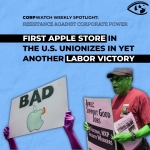US: The Escalating Obesity Wars
The full-page newspaper ads shout "Hype" at readers, warning them that they
have "been force-fed a steady diet of obesity myths by the 'food police,' trial
lawyers, and even our own government."
The sponsor, the Center for Consumer Freedom, is a "nonprofit organization
dedicated to protecting consumer choices and promoting common sense," the ad
notes.
The group was founded about 10 years ago with tobacco-company and restaurant
money to fight smoking curbs in restaurants. Back then, the group called itself
Guest Choice Network. But it changed its name in 2001, as it shifted its focus
to food and beverage issues, raised by concerns about obesity, mad cow disease
and genetically modified products.
The group and its ads are the brainchild of Richard Berman, a Washington
lobbyist and lawyer who is the center's executive director. Berman is also
president of Berman & Co., a public affairs firm that in 2003 received more
than $1.1 million in compensation from the nonprofit group -- more than a third
of its revenue that year, according to its most recent tax returns.
Berman, 62, also is the founder of two other restaurant-supported groups: the
American Beverage Institute, which fights restrictions on alcohol use, and the
Employment Policies Institute Foundation, which has argued against raising the
minimum wage -- a move that would hurt restaurants because of their large staffs
of low-wage workers.
Philip Morris USA Inc. pledged $600,000 -- most of the seed money -- for
Berman's group in 1995. The company said it needed a consultant who was both a
"hospitality industry insider as well as a legislatively astute individual,"
according to documents collected as part of the multi-state lawsuit against
tobacco companies. Under the 1998 settlement, the documents were made public.
Philip Morris continued to give money to Berman for several years, as did
restaurant firms such as Host Marriott Corp. and Brinker International Inc.,
which owns the Chili's Grill & Bar and Maggiano's Little Italy restaurant
chains. Neither firm returned phone calls about their ties to the Center for
Consumer Freedom.
Berman declined to give specifics about who funds the Center for Consumer
Freedom. He said only that it is funded by a coalition of restaurant and food
companies as well as some individuals. "It doesn't add anything" to give
details, Berman said.
According to Citizens for Responsibility and Ethics in Washington, a watchdog
group funded by several educational foundations, Berman and his firm have
received more than $7 million since 1997 from the Center for Consumer Freedom
and one of the other groups he founded. Last fall, the watchdog group asked the
Internal Revenue Service to revoke the Center for Consumer Freedom's 501(c)(3)
tax-exempt status. The watchdog group said Berman has used the center to funnel
money to himself and his company, a violation of federal tax law that bars
companies or individuals from running a nonprofit for their private benefit. The
organization also said that the group's activities were solely to promote the
causes of restaurants and food producers, not consumers. Its activities, the
organization said, are "not remotely charitable."
Jeffrey S. Tenenbaum, a Washington lawyer who specializes in nonprofit tax
law, said that generally, for a group to qualify as a 501(c)(3) educational
organization "there has to be bona fide education of the general public on given
issues as compared to advocating particular industry positions." Otherwise, the
group should qualify as a 501(c)(6), a trade and professional group. While both
are both tax-exempt, a 501(c)(6) cannot receive tax-deductible charitable
contributions.
Berman called Citizens for Responsibility and Ethics in Washington's charges
"a silly thing . . . totally and factually false." It's not unusual, he said,
for public affairs firms to manage nonprofits, and the expenses his firm
received were to "buy all sorts of things, including employee time, rent,
phones." Berman said the Center for Consumer Freedom is a legitimate, nonprofit
educational group. "I haven't heard from the IRS, and I don't expect to; there's
nothing to it."
"It's pretty obvious we're advocating from a point of view," Berman said.
"But you can advocate and educate at the same time."
Berman said the charges are the "cost of doing business" of criticizing
well-known activist groups such as People for the Ethical Treatment of Animals,
Center for Science in the Public Interest and the Physicians Committee for
Responsible Medicine. "It's to be expected when you give people a little
heartburn, they don't like what you're doing."
Berman is not shy about going after groups his organizations oppose. A Web
site sponsored by the Center for Consumer Freedom, ActivistCash.com, includes
in-depth profiles of groups, including Mothers Against Drunk Driving, detailing
their funding and key players. "Despite their innocent-sounding names, many of
these organizations are financial Goliaths that use junk science, intimidation
tactics, and even threats of violence to push their radical agenda," the Web
site says.
Berman himself has said these groups have "a violent side to them" and will
try to shut down firms whose activities run counter to their goals. He said that
is why he won't name the companies who support his organization.
The Physicians Committee for Responsible Medicine scoffed at that assertion,
saying its "policies would specifically exclude anyone promoting violence or
illegal activity from functioning as a spokesperson or having any role in the
organization."
"I'm troubled by this message and this industry that sells unhealthy things
and are so willing to sacrifice the health of consumers," said Neal Barnard,
president of the physicians group.
PRWatch, a nonprofit critic of the public relations industry, lists what it
claims are the Center for Consumer Freedom's sponsors on its Web site. Those
companies include Brinker International; RTM Restaurant Group, the owner of
Arby's; Tyson Foods Inc.; HMSHost Corp.; and Wendy's International Inc.
Few of those companies returned phone calls seeking comment. A Tyson
spokesman said the company does "not share lists of organizations we support." A
Wendy's spokesman, Denny Lynch, said the company has supported Berman's group in
the past but declined to say when or how much. Lynch said Berman's group
provides "a balancing perspective . . . another voice" in the increasingly loud
debate over obesity.
Berman called PRWatch's list inaccurate and said the only reason the group is
criticizing him is because he had criticized some of its leaders for a book they
wrote about mad cow disease and its chances of occurring in the United States.
"They have had it in for me for a long time," Berman said.
Sheldon Rampton, co-author of the book and research director of the Center
for Media & Democracy, which owns PRWatch, said his group first learned of
Consumer Freedom when the group attacked the book. But "we write about a lot of
groups and would have reached the same conclusion about him if that had not been
the case," he said.
Food industry officials who spoke only on the condition that they not be
identified by name or by where they work said that by keeping the sponsors
anonymous, Berman's group can be more vociferous, provocative and irreverent in
its criticisms than a trade association. Berman's "stuff is factual, but
everyone chooses the facts they represent," one executive said.
Berman agrees that his group can be edgier. "There's no doubt about that.
Most trade associations try to insulate individual companies and brand names
from cutting-edge rhetoric."
Over the years, the group's attacks on food critics have intensified. Last
fall, the group ran a television ad featuring the "Seinfeld" Soup Nazi character
barking at an overweight consumer, "Nothing for you! Come back when you're
thinner." The ad asks: "Has the war on obesity gone too far?"
In February, immediately before and after the president's State of the Union
address, the group broadcast another ad, showing a lawyer grilling a Girl Scout
for selling cookies. "Learn more about lawyers cashing in on obesity," the ad
said, calling on viewers to check out the group's Web site.
The center's campaign comes as Americans are bombarded with books and
documentaries criticizing the fast-food diet. While many restaurants have
introduced healthier fare to address these concerns, some are also offering
consumers even bigger portions, such as the Enormous Omelet Sandwich at Burger
King, the Monster Burger -- two one-third-pound patties -- at Hardee's and the
Ultimate Colossal Burger -- two half-pound burgers on a triple-decker bun with
cheese -- at Ruby Tuesday.
The immediate catalyst for this week's $600,000 newspaper advertising
campaign was an announcement earlier this month by the Centers for Disease
Control and Prevention that it had vastly overestimated the number of deaths
caused by obesity. The ads appeared in six major newspapers, including in
Atlanta, where the CDC is based. Ads will soon appear in Washington's Metro
system to get the attention of the nation's "opinion leaders," congressional
staff members and other key government employees, according to the group's
spokesman, Mike Burita. In March 2004, the CDC published a report linking
obesity to 400,000 deaths a year in the United States. Three months later, the
Center for Consumer Freedom began challenging that statistic, issuing its first
of many statements saying the deaths were vastly overstated.
Last week, the CDC announced new estimates, linking 112,000 deaths to
obesity.
Now, Berman said, the CDC needs to "come clean, to say it made a mistake,"
one that led to school boards, state legislatures and even members of Congress
calling for all sorts of restrictions on food sales.
The CDC needs to announce its mistake "loudly and often," Berman said.
But so far, the CDC appears to have no such intentions. "We still consider
obesity to be a major public health threat, although there's uncertainty about
the number of deaths from obesity," said Karen Hunter, a CDC spokeswoman. "There
is no debate in our mind that obesity plays a role in increasing the risk of
serious chronic disease like diabetes, heart disease and certain cancers."
- 188 Consumerism & Commercialism


